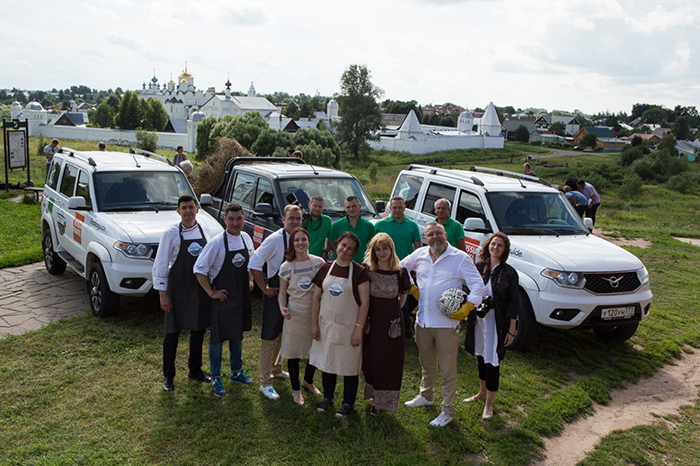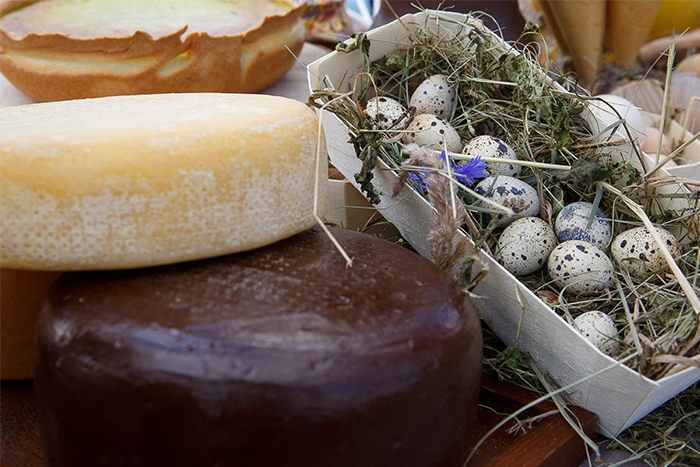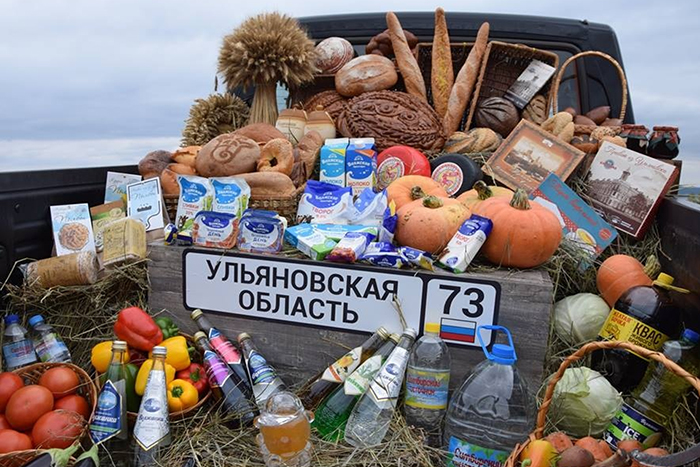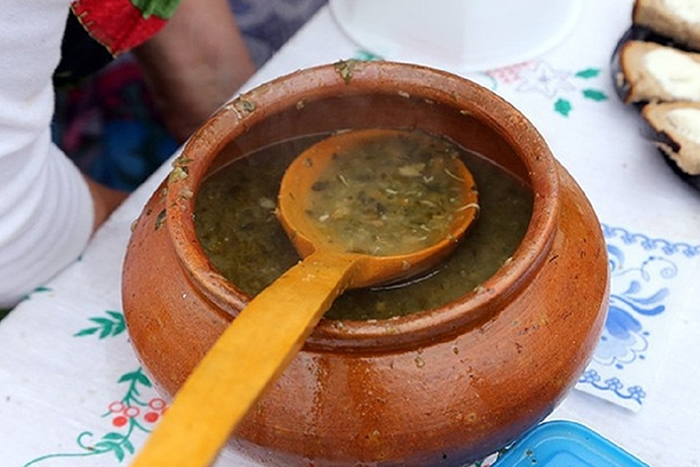
You Should Know What’s There! Russia Plans Gastronomical Tours
/ Главная / Russkiy Mir Foundation / Publications / You Should Know What’s There! Russia Plans Gastronomical ToursYou Should Know What’s There! Russia Plans Gastronomical Tours
Svetlana Alekseeva
Ten Russian regions, including five that will host the World Cup next year, are taking part in the “Gastronomical Map of Russia” federal project. This means that visitors to these regions will be able to enjoy not only their cultural and natural landmarks, but also culinary samplings made from local products.
Today Russia is among the ten most visited countries in the world—every year our country hosts around 25 million tourists, the director of the Federal Tourism Agency, Oleg Safonov, said at a TASS press conference. For a long time people considered Russia’s major tourism brands to be its cultural and historical sights, as well as its natural treasures.

[Photo: russia.travel]
But of course, you can’t fill your stomach on beautiful sights. Now there is a plan to attract tourists—both domestic and visitors from abroad—to Russia with the aid of food. “Gastrotourism is one of today’s most promising trends, a powerful driver of the tourism sector, one with enormous export potential,” said Oleg Safonov, describing this new trend. In the near future, the national tourism website Russia Travel will add an interactive Gastronomical Map of Russia, which potential visitors can use to find out what delicacies are on offer in any given region.
The cuisines of Russia’s peoples are also part of the immaterial wealth of our nation. We possess enormous wealth, which needs to be promoted and can earn dividends.
In itself, the idea of gastro-tourism is anything but new. In many countries worldwide, it has worked successfully for a long time. Nothing would seem simpler: every region has its own culinary delicacies, so you just cook these recipes and feed tourists. But it was evident that Russia needed to create an infrastructure for gastro-tourism practically from scratch.

[Photo: russia.travel]
Back in 2014 Russian restaurateurs signed a memorandum on promoting Russian cuisine, says the president of the Russian Federation of Restaurateurs and Hoteliers Igor Bukharov. But one question arose right away: what exactly is “Russian cuisine?” According to Bukharov, foreigners generally don’t know anything about it—well, maybe the standard lineup of “vodka, bliny, and caviar.” And it’s not just foreigners. Even Russian citizens can hardly name more than ten national dishes—not counting Caucasian shashlyk, Ukrainian borsht, or Uzbek plov.
It’s no surprise that the renaissance in Russian cooking is progressing nowhere near as fast as one would like. “Not long ago I was invited to an Italian restaurant in Vologda,” Igor Bukharov shared with those afflicted. “I asked: are there any Italians on the staff? No. How about ingredients from Italy? Nope. Well, is there anyone who studied the restaurant business in Italy at least? This is also unfair to our colleagues—Italian chefs and their consumers.” But evidently, it was much easier to feed visitors with purportedly “Italian” pizzas and pastas than to invent and develop something of one’s own.
But why even talk about Italian cuisine when future cooks are still today studying the collection of recipes approved way back in 1955 by Anastas Mikoyan? Incidentally, Igor Bukharov has assured us that the Ministry of Education is at work on this matter.

[Photo: russia.travel]
In his opinion, restaurateurs today must take on age-old recipes and present them in a new way—just as France created a “new cuisine” in the past.
Gastrotourism isn’t an invitation to a restaurant—it’s an invitation to travel.
By the way, Bukharov is certain that there is no such thing as “French cuisine,” but only the cuisines of different regions: Normandy, Brittany, the French Riviera. This is even more relevant to a country as enormous as Russia. “We have the cuisines of the northern regions, central Russia, the Volga region, the Caucasus, the Urals, Siberia, and the Far East,” he enumerates. And the most important thing is not to forget that gastro-tourism isn’t only about food but also about the culinary arts. You don’t need to feed tourists so much as astonish them—by offering something exclusive that they have never tried anywhere else. And what’s more, it should be prepared exclusively from local products.
“Over the past two years, we have engaged in a colossal endeavor, taking approximately 600 people on test gastro-tours,” says the coordinator and one of the people who inspired the concept of the “Gastronomical Map of Russia,” Ekaterina Shapovalova. “It was evident that the tourist of today wants not only to taste a product but to follow its path to the table.” This means that beyond the direct participation of restaurateurs the project has actively involved the farmers who produce local products. And what finally appears on the table depends on the fantasy of the head chefs.

[Photo: russia.travel]
For instance, as part of a gastro-tour in Suzdaly today, one can taste cucumber jelly, Muromsk kalach loaves, Suzdal kolobki, imperial chicken pie, and many-layered stuffed pies. In Ulyanovsk, one can try “Oblomov pie” with spring chicken and mushrooms and Volga fish pie. In Udmurtia, there are pastries and cakes with various fillings, pelmeni with salmon, pike, rush, and radish. Tver Oblast is planning to surprise visitors with “that well-known Pozharsky cutlet,” named in honor of Evdokim Pozharsky, the owner of a hotel and tavern in Torzhok in the early 19th century, who was featured in the verses of Alexander Pushkin.
It sounds improbably inspirational, but it’s important to remember, as Ekaterina Shapovalova puts it, that “gastro-tourism isn’t an invitation to a restaurant—it’s an invitation to travel.”
New publications

 Mikhail Kalatozov, a director who transformed the world of cinematography in many ways, was born 120 years ago. He was a Soviet film official and a propagandist. Above all, he was capable of producing movies that struck viewers with their power and poetic language.
Mikhail Kalatozov, a director who transformed the world of cinematography in many ways, was born 120 years ago. He was a Soviet film official and a propagandist. Above all, he was capable of producing movies that struck viewers with their power and poetic language.  Ukrainian authorities have launched a persecution campaign against the canonical Ukrainian Orthodox Church (UOC), the biggest one in the country's modern history. Over the past year, state sanctions were imposed on clergy representatives, searches were conducted in churches, clergymen were arrested, criminal cases were initiated, the activity of the UOC was banned in various regions of the country, and monasteries and churches were seized.
Ukrainian authorities have launched a persecution campaign against the canonical Ukrainian Orthodox Church (UOC), the biggest one in the country's modern history. Over the past year, state sanctions were imposed on clergy representatives, searches were conducted in churches, clergymen were arrested, criminal cases were initiated, the activity of the UOC was banned in various regions of the country, and monasteries and churches were seized.  When Nektary Kotlyaroff, a fourth-generation Russian Australian and founder of the Russian Orthodox Choir in Sydney, first visited Russia, the first person he spoke to was a cab driver at the airport. Having heard that Nektariy's ancestors left Russia more than 100 years ago, the driver was astonished, "How come you haven't forgotten the Russian language?" Nektary Kotlyaroff repeated his answer in an interview with the Russkiy Mir. His affinity to the Orthodox Church (many of his ancestors and relatives were priests) and the traditions of a large Russian family brought from Russia helped him to preserve the Russian language.
When Nektary Kotlyaroff, a fourth-generation Russian Australian and founder of the Russian Orthodox Choir in Sydney, first visited Russia, the first person he spoke to was a cab driver at the airport. Having heard that Nektariy's ancestors left Russia more than 100 years ago, the driver was astonished, "How come you haven't forgotten the Russian language?" Nektary Kotlyaroff repeated his answer in an interview with the Russkiy Mir. His affinity to the Orthodox Church (many of his ancestors and relatives were priests) and the traditions of a large Russian family brought from Russia helped him to preserve the Russian language.

 The leaders of the Friends of the Great Russia cultural association (Amici Della Grande Russia) in Italy believe that the Western policy of abolishing Russian culture in Europe has finally failed. Furthermore, it was doomed to failure from the beginning.
The leaders of the Friends of the Great Russia cultural association (Amici Della Grande Russia) in Italy believe that the Western policy of abolishing Russian culture in Europe has finally failed. Furthermore, it was doomed to failure from the beginning.  Name of Vladimir Nemirovich-Danchenko is inscribed in the history of Russian theater along with Konstantin Stanislavski, the other founding father of the Moscow Art Theater. Nevertheless, Mr. Nemirovich-Danchenko was a renowned writer, playwright, and theater teacher even before their famous meeting in the Slavic Bazaar restaurant. Furthermore, it was Mr. Nemirovich-Danchenko who came up with the idea of establishing a new "people's" theater believing that the theater could become a "department of public education."
Name of Vladimir Nemirovich-Danchenko is inscribed in the history of Russian theater along with Konstantin Stanislavski, the other founding father of the Moscow Art Theater. Nevertheless, Mr. Nemirovich-Danchenko was a renowned writer, playwright, and theater teacher even before their famous meeting in the Slavic Bazaar restaurant. Furthermore, it was Mr. Nemirovich-Danchenko who came up with the idea of establishing a new "people's" theater believing that the theater could become a "department of public education."  "Russia is a thing of which the intellect cannot conceive..." by Fyodor Tyutchev are famous among Russians at least. December marks the 220th anniversary of the poet's birth. Yet, he never considered poetry to be his life's mission and was preoccupied with matters of a global scale. Mr.Tyutchev fought his war focusing on relations between Russia and the West, the origins of mutual misunderstanding, and the origins of Russophobia. When you read his works today, it feels as though he saw things coming in a crystal ball...
"Russia is a thing of which the intellect cannot conceive..." by Fyodor Tyutchev are famous among Russians at least. December marks the 220th anniversary of the poet's birth. Yet, he never considered poetry to be his life's mission and was preoccupied with matters of a global scale. Mr.Tyutchev fought his war focusing on relations between Russia and the West, the origins of mutual misunderstanding, and the origins of Russophobia. When you read his works today, it feels as though he saw things coming in a crystal ball...